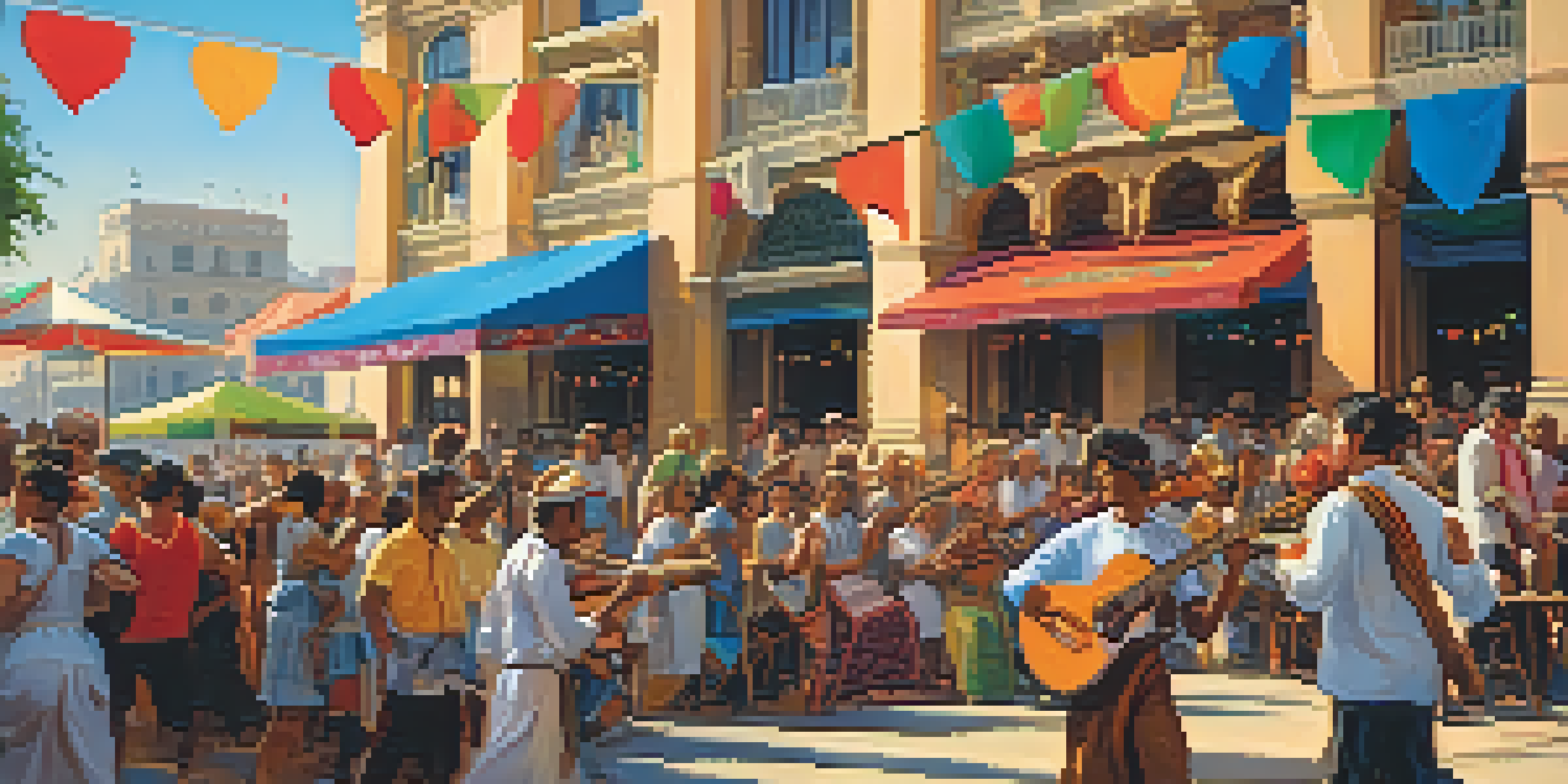The Impact of African American Culture on Georgia's Heritage

The Roots of African American Culture in Georgia
African American culture in Georgia traces its roots back to the early 18th century, when enslaved people were brought to the region. These individuals contributed significantly to the development of Georgia's agricultural economy, especially in the cultivation of crops like cotton and tobacco. Their traditions, languages, and culinary practices laid the groundwork for a vibrant cultural tapestry that still exists today.
Music is a world within itself, it's a language we all understand.
Over time, African American communities formed their own social structures, which were often centered around churches and family units. These institutions became vital in preserving cultural identity and fostering resilience against the backdrop of systemic oppression. As a result, the cultural expressions that emerged—such as music, dance, and storytelling—became powerful tools for community cohesion and resistance.
Today, the influence of these early African American communities is still evident across Georgia, from the annual festivals that celebrate their heritage to the historic sites that commemorate their struggles and triumphs. Understanding these roots gives us a deeper appreciation for the rich cultural landscape of Georgia.
Music: The Heartbeat of African American Culture in Georgia
Music has played a pivotal role in shaping African American culture in Georgia, serving as both an expression of joy and a form of resistance. Genres such as blues, jazz, and gospel originated from African American communities and have profoundly influenced the broader American music scene. Notably, cities like Atlanta and Savannah have produced iconic artists who have left an indelible mark on music history.

The blues, often seen as the soundtrack of African American life, emerged from the hardships faced by communities in the rural South. Artists like Ma Rainey and Bessie Smith, who hailed from Georgia, used their music to articulate struggles and resilience, resonating with audiences far beyond state lines. This connection through music fosters a sense of identity and pride within the African American community.
Cultural Roots in Georgia's History
African American culture in Georgia has deep historical roots, shaped by the contributions of enslaved individuals who cultivated a rich tapestry of traditions.
Today, festivals celebrating these musical genres attract visitors from all over, highlighting Georgia's rich musical heritage. From the Atlanta Jazz Festival to the Macon Cherry Blossom Festival, these events not only honor the past but also ensure that the legacy of African American music continues to thrive.
Culinary Traditions: Flavors of African American Heritage
The culinary landscape of Georgia is deeply influenced by African American traditions, which blend African, Native American, and European flavors. Dishes such as gumbo, collard greens, and cornbread reflect a rich history of resourcefulness and creativity. These foods often tell stories of survival and community, bringing people together around the dinner table.
There is no greater agony than bearing an untold story inside you.
Soul food, a term that encompasses a variety of traditional dishes, originated from the culinary practices of enslaved African Americans. It not only nourished bodies but also served as a means of cultural expression and connection. Restaurants across Georgia, particularly in cities like Atlanta and Augusta, celebrate this heritage by serving up time-honored recipes that have been passed down through generations.
Moreover, the influence of African American cooking extends beyond traditional soul food, impacting contemporary cuisine as well. Chefs are now incorporating these time-honored techniques into modern dishes, showcasing the ongoing evolution and relevance of African American culinary traditions in Georgia's dining scene.
Art and Literature: A Reflection of Cultural Identity
Art and literature have been essential in expressing the experiences and struggles of African Americans in Georgia. From the poignant works of authors like Alice Walker and James Baldwin to the vibrant paintings of artists like Howardena Pindell, these creative expressions offer profound insights into the African American experience. They serve not only as a reflection of individual identity but also as a commentary on societal issues.
Georgia has a rich literary tradition that showcases the voices of African American writers who have shaped the cultural landscape. Events such as the Savannah Book Festival highlight these contributions, bringing together authors and readers to explore themes of race, identity, and resilience. Such gatherings foster a sense of community and recognition for the literary achievements within the African American community.
Music as a Cultural Expression
Music genres like blues and jazz, originating from African American communities, serve as powerful expressions of identity and resilience.
Additionally, visual arts have played a significant role in preserving and promoting African American heritage. Galleries and cultural centers across Georgia, such as the Hammonds House Museum in Atlanta, showcase works that celebrate this rich artistic legacy, ensuring that these vital stories continue to be told and appreciated.
Spirituality and Religion: Foundations of Community Strength
Spirituality and religion have long been cornerstones of African American culture in Georgia, providing strength and solace amidst adversity. The Black church has served as a crucial institution, fostering community cohesion and activism. It was within these sacred spaces that many civil rights leaders, like Martin Luther King Jr., found their voices and called for social change.
Religious practices often blend African traditions with Christian beliefs, creating unique expressions of faith that resonate deeply within the community. This spiritual heritage is reflected in the powerful music and rituals practiced in many African American churches, which continue to inspire and uplift congregations today. These practices not only offer comfort but also reinforce a shared cultural identity.
Moreover, the impact of spirituality extends beyond the church walls, influencing social justice movements and community organizing. The legacy of African American religious leaders in Georgia serves as a reminder of the vital role faith plays in advocating for equality and justice, shaping both the past and future of the state.
Education and Advocacy: Empowering Future Generations
Education has been a crucial pillar of African American culture in Georgia, with community leaders advocating for equitable access to learning opportunities. From the establishment of historically black colleges and universities (HBCUs) like Spelman College to grassroots organizations fighting for educational equity, the commitment to knowledge has been unwavering. These institutions not only empower individuals but also serve as incubators for social change.
The struggle for civil rights in Georgia was heavily tied to educational access, with figures like W.E.B. Du Bois and Booker T. Washington emphasizing the importance of education in lifting the African American community. Their legacies continue to inspire initiatives aimed at improving educational outcomes for today’s youth, ensuring that the fight for equity remains a priority.
Festivals Celebrate Cultural Heritage
Celebrations and festivals in Georgia honor African American culture, reinforcing community ties and keeping historical legacies alive.
Today, various programs and scholarships aim to support African American students in Georgia, helping them achieve academic success and pursue their dreams. This ongoing commitment to education reflects the resilience and determination of the community, ensuring that future generations carry on the rich cultural heritage.
Celebrations and Festivals: Honoring Cultural Legacy
Celebrations and festivals play a vital role in honoring and preserving African American culture in Georgia. Events like the Atlanta Dogwood Festival and the Juneteenth celebrations not only showcase art, music, and food but also serve as platforms for cultural education and awareness. These gatherings bring together diverse communities to celebrate a shared heritage, reinforcing connections among participants.
Many of these festivals highlight the significance of African American history and its contributions to Georgia's broader cultural identity. For instance, the Sweet Auburn Springfest celebrates the historic Sweet Auburn District, once a thriving center of African American commerce and culture. Such events are essential in keeping the stories and legacies of African Americans alive for future generations.

Moreover, these celebrations foster a sense of pride and belonging, drawing attendees from all walks of life. By participating in these communal experiences, people can appreciate the richness of African American culture and its enduring impact on Georgia's heritage.